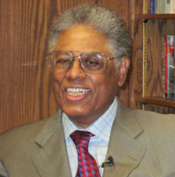Throw the Rascals Out?
Weekly Editorial — Posted on October 31, 2013

Economist Thomas Sowell
(by Thomas Sowell, Townhall) – Polls indicate that the public is so disgusted with Washington politicians of both parties that a surprisingly large proportion of the people would like to get rid of the whole lot of them.
It is certainly understandable that the voters would like to “throw the rascals out.” But there is no point in throwing the rascals out, if we are just going to get a new set of rascals to replace them.
In other words, we need to think about what there is about current political practices that repeatedly bring to power such a counterproductive set of people. Those we call “public servants” have in fact become public masters. And they act like it.
They squander ever more vast amounts of our tax money, and still leave trillions of dollars of national debt to be paid by our children and grandchildren. They intrude into our private lives with ever more restrictions, red tape and electronic surveillance. And they turn different groups of Americans against each other with class warfare rhetoric and policies.
None of this is inevitable. In fact, this pattern is largely the culmination of political trends set in motion during the 1930s, and reaching a climax today. During the 1920s, the national debt was reduced and the role of government scaled back. Unemployment went as low as 1.8 percent.
President Calvin Coolidge, with every prospect of being reelected in 1928, declared simply: “I do not choose to run.” Later, in his memoirs, he explained how dangerous it is to have anyone remain too long in the White House, surrounded by flattery and insulated from reality. What a contrast that attitude is with the attitude of the current occupant of the White House!
The contrast extends beyond these two presidents. What we have today that we did not have in the early history of this country is a permanent political class in Washington — a Congress and an ever growing federal bureaucracy composed of people who have become a permanent ruling class.
The United States was not founded by career politicians but by people who took time out from their regular professions to serve during a crucial time in the creation of a new nation, and a new kind of nation in a world ruled by kings and emperors.
In the nineteenth century, there was a high rate of turnover in members of Congress. Many people went to Washington to serve one term in Congress, then returned to their home state to resume their lives as private citizens.
The rise of the permanent political class in Washington came with the rise of a vast government apparatus with unprecedented amounts of money and power to control and corrupt individuals, institutions and the fabric of the whole society.
The first giant steps in this direction were taken in the 1930s, when the Great Depression provided the rationale for a radically expanded role of government that President Franklin D. Roosevelt and his followers had believed in before there was a Great Depression.
There are now people in Washington whose entire adult lives have been spent in government, in one role or another. Some begin as aides to politicians or as part of the sprawling empires of the federal bureaucracy. From this they progress to high elective or appointed offices in government.
Turnover in Congress has been reduced almost to the vanishing point. Political alliances within government and with outside special interests, as well as the gerrymandering of Congressional districts, make most incumbents’ reelection virtually a foregone conclusion.
The ability to distribute vast amounts of largess to voters, at the taxpayers’ expense — President Obama’s giving away free cell phones during an election year being just the tip of the iceberg — further tilts the balance in favor of incumbents.
This kind of government must constantly “do something” in order to keep incumbents’ names in the news. In short, big government has every incentive to create bigger government.
Throwing the rascals out will not get rid of this political pattern. The first step in limiting, and then scaling back, government itself must be limiting the time that anyone can remain in office — preferably limited to one term, to make it harder to become career politicians, a species we can well do without.
Thomas Sowell is a senior fellow at the Hoover Institution, Stanford University and the author of “Basic Economics,” ”Applied Economics” and “The Housing Boom and Bust.” Over the past three decades, Dr. Sowell has taught economics at various colleges and universities, including Cornell, Amherst, and the University of California at Los Angeles.
Posted at Townhall.com on October 29, 2013. Reprinted here October 31, 2013 for educational purposes only.
Questions
1. Answer the following according to Thomas Sowell:
a) How does Dr. Sowell view today's politicians? (see para. 3-4)
b) How are they different from the elected officials our country has had up until the 1930s? (para. 8-9)
c) How did this change originate? (see para. 11)
d) How do incumbents (current office holders) continually win re-election?
2. What does Thomas Sowell identify as a problem in his commentary "Throw the Rascals Out"?
3. a) What solution does Dr. Sowell offer?
b) What do you think of this solution?
c) Ask a parent the same question.
